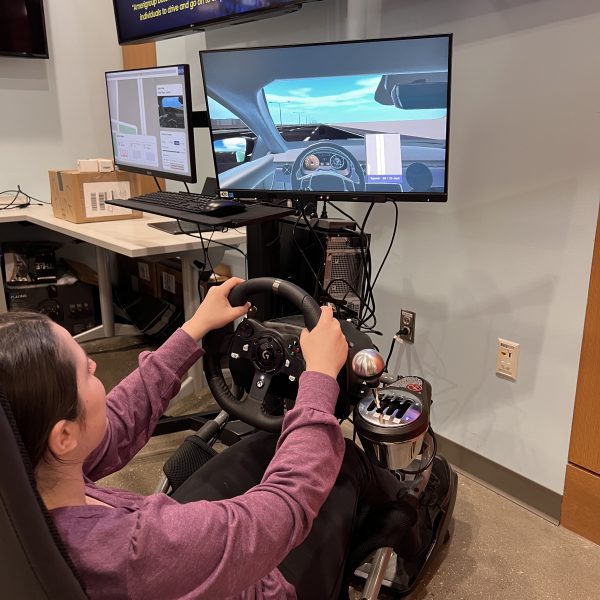With more than 60% of autistic teenagers and young adults facing challenges obtaining a driver’s license, technology developed at Vanderbilt University’s School of Engineering is aiming to close that gap with an AI-powered driving simulator that assists neurodivergent learners.
Neurodiverse Technologies Inc. recently launched SANDI – the Simulator for Advanced Neurodiverse Driving Instruction based on the work done at Vanderbilt. The simulator is built specifically for teenagers and adults on the autism spectrum and combines cognitive-behavioral training, emotional resilience development, and real-time physiological feedback to help students develop confidence behind the wheel.
 “What started as an idea in a lab has become something that can truly impact the world,” said Nilanjan Sarkar, vice dean of Vanderbilt’s School of Engineering, David K. Wilson Professor of Engineering, and the director of the Robotics and Autonomous Systems Laboratory where the driving simulator was created. “We’ve harnessed AI and advanced sensing to create a product that adapts to how neurodiverse learners experience the world.”
“What started as an idea in a lab has become something that can truly impact the world,” said Nilanjan Sarkar, vice dean of Vanderbilt’s School of Engineering, David K. Wilson Professor of Engineering, and the director of the Robotics and Autonomous Systems Laboratory where the driving simulator was created. “We’ve harnessed AI and advanced sensing to create a product that adapts to how neurodiverse learners experience the world.”
The research and initial prototype development were done at the Robotics and Autonomous Systems Lab using grants from the National Institutes of Health (NIH) and National Science Foundation (NSF) and was a collaborative effort between engineers and clinical psychologists. Later, the Frist Center for Autism and Innovation at Vanderbilt helped with support to mature the product for commercialization.
In partnership with the Frist Center for Autism and Innovation and its director, Keivan Stassun, Sarkar is now commercializing the driving education system with Nashville-based entrepreneur and Neurodiverse Technologies CEO Jan Schlueter.
“This is exactly the kind of breakthrough technology the Frist Center was created to foster,” said Stassun. “SANDI exemplifies innovation that’s equally grounded in cutting-edge science and its potential to make a meaningful impact on the world.”
While the technology is noteworthy, Schlueter said changing lives is what matters most.
“We are proud to commercialize a solution born from Vanderbilt’s legacy of academic excellence, shaped by the voices of neurodiverse individuals, and fueled by the belief that everyone deserves the freedom to drive,” he said.